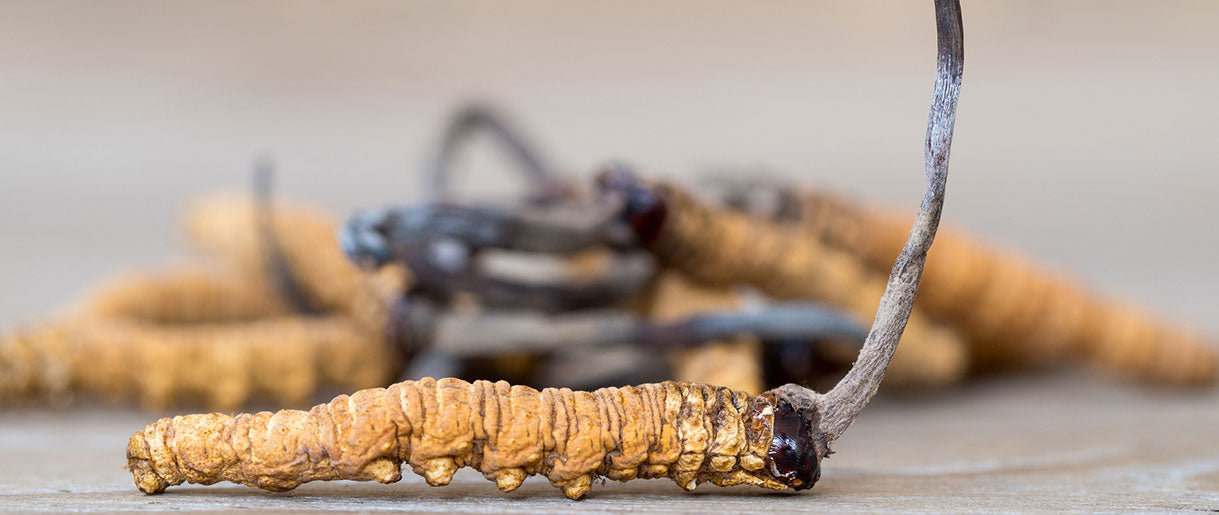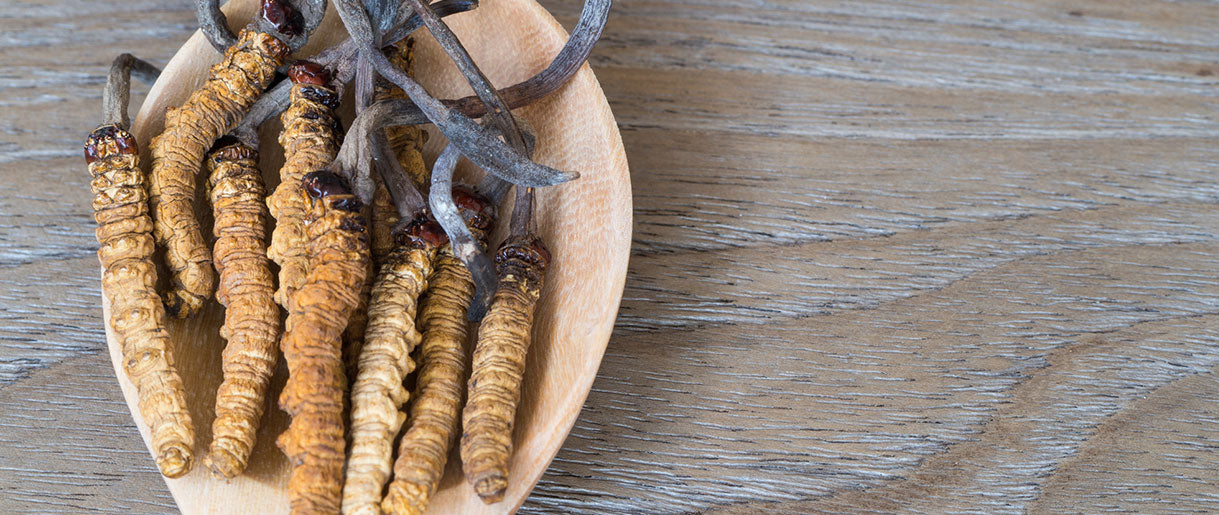Functional mushrooms have been used in human holistic health for ages, but a few essential types have recently gained mainstream recognition. Today, we'll look at the critical differences between Cordyceps and another well-known medicinal mushroom: Reishi. While both of these mushrooms have one thing in common—the capacity to enhance the immune system—each has its different claim to fame. How do you decide which one to choose?
What’s the difference between Cordyceps vs. Reishi? Let’s get into it.
Overview Of Cordyceps Mushroom

Traditional Cordyceps usage in Chinese medicine first appeared in 1757 AD and was known for its immune-modulating qualities. In old Chinese medical literature and Tibetan medicine, this unusual combination of a caterpillar and a fungus was described as a medication.
Cordyceps (Cordyceps sinensis) is a rare and expensive mushroom that grows on bugs high on the Tibetan plateau. Fortunately, another species of Cordyceps (Cordyceps militaris) can be cultivated and utilized in most Cordyceps mushroom supplements.
The cultivated form has a somewhat similar profile to the traditional species, except it contains substantially more cordycepin, a potent health-boosting component.
Cordyceps is known as the "energy fungus" and is commonly used to support energy and endurance.
Overview Of Reishi Mushroom

Popular due to its stunning kidney- or fan-shaped look and vibrant orange-red colors, Reishi is known by various other names, such as:
- Ganoderma lucidum
- The Mushroom of Immortality
- Lingzhi
- Nature’s Xanax
Lingzhi is a stunning fungus with sparkling rings in vibrant colors like gold, burgundy, and orange. For almost 2,000 years, Chinese medicine has recognized the benefits of Reishi mushrooms! However, modern Western research is catching up.
Discovering Reishi in the wild is rare because the mushroom only grows on two or three of the 10,000 eligible trees.
Reishi grows naturally on hemlock trees in tropical and temperate areas such as North America and the Amazon.
Reishi vs cordyceps: Key Bioactive Compounds And Their Effects
Cordyceps and Reishi mushrooms are the two most popular and sought-after medicinal mushrooms. These mushrooms have unique bioactive compounds in their cells wall that should be extracted for optimal utilization by the body. Below we outline their essential bioactive compounds and their effects on the body.
Cordyceps

Cordyceps, like all medicinal mushrooms, contains a wealth of bioactive chemicals. Some of the most important ones that have been studied and deemed to support Cordycep's "life-supporting" effects are:
- Polysaccharides.
- Nucleosides.
- Amino Acids.
- Sterols.
- Cordycepin.
- Polypeptides.
A study(1) examined the breakdown and concentration levels of numerous critical chemicals found in Cordyceps. The study found that the adenosine concentration was 0.06% in the corpus and 0.18% in the fruiting body.
Cordycepin concentrations in the fruiting body were 0.97% and 0.36%, respectively. The contents of adenosine and cordycepin differed between the fruiting body and the corpus of C. militaris. The concentrations of adenosine and cordycepin in the fruiting body were nearly three times greater than in the corpus. The concentration of adenosine was lower than the concentration of cordycepin.
Through purinergic and pyrimidine receptors, nucleosides can adjust and govern the physiological functions of the human body. Cordycepin is a class of chemicals with substantial therapeutic potential and numerous intracellular targets such as nucleic acid, apoptosis, and cell cycle.
Adenosine is an energy transfer and signals transductant in cells. It can still provide cytoprotection or prevent tissue damage in various ways, including treating chronic heart failure, anti-inflammatory qualities, and anticonvulsant activity.
Reishi

Reishi is well-known for being high in bioactive compounds such as polysaccharides, triterpenoids, and peptidoglycans, all of which can aid in strengthening the immune system. In one study, five superfood mushroom species, including Reishi(2), were revealed to have immunomodulatory effects by raising TH1 cytokine production in both in vitro and in vivo models.
Reishi is also known for its adaptogenic qualities. Adaptogens are natural compounds that can help the body maintain equilibrium due to biological and environmental stressors. They work directly with your hypothalamus, pituitary, and adrenal glands to promote tranquility and calmness.
Reishi Mushroom Vs Cordyceps: Health Benefits And Traditional Uses
We know Reishi and Cordyceps are packed with bioactive compounds, which translates to incredible health benefits. Below we examine Cordyceps vs Reishi mushroom benefits.
Cordyceps

Cordyceps has traditionally been used by elderly people to relieve weariness and increase vigor and sex drive. Sikkim's traditional healers advocate the fungus Cordyceps sinensis as a therapeutic for "all illnesses" since it enhances appetite, energy, libido, stamina, endurance, and sleeping habits.
Cordyceps mushroom is essential for preserving energy, endurance, and athletic performance by encouraging healthy blood flow, raising the body's lactate tolerance, and stimulating ATP (the energy source for muscles).
Cordyceps' strong antioxidant content can help battle weariness and stress and even stimulate libido due to its ability to improve blood flow.
Cordycepin is an immunoregulatory molecule that can assist in boosting the immune system's ability to resist damaging free radicals, supporting overall well-being. Cordyceps can be relied on to enhance longevity while also enhancing heart health, cutting cancer risk, and lowering blood sugar and cholesterol.
Reishi

Reishi is used to treat asthma, arthritis, sleeplessness, gastric ulcers, and bronchitis in traditional Chinese medicine. Reishi is an immunomodulator and may act as an anti-inflammatory, but here are some of the health advantages that are unique to the mushroom such as:
Ganoderic acids are compounds that maintain and protect the liver, assisting in detoxification. Ganoderic acid may have anti-cancer properties as well.
Reishi defends the body from dangers and viruses by combating free radicals.
Reishi is also used medicinally in Chinese medicine to increase immunity against everything from the common cold to cancer by enhancing the activity of the body's vital white blood cells.
Reishi mushroom is well-known for its calming, relaxing, and sleep-inducing properties. It may also provide relief and mood enhancement for persons suffering from anxiety or depression and relieve exhaustion.
Potential Side Effects And Precautions

Reishi and Cordyceps are generally safe for use. However, there are some potential side effects and precautions to consider while using them.
Although cordyceps is well tolerated, some people may develop modest side effects such as stomach aches or dry mouth. Individuals with blood clotting issues should see their doctor before using Cordyceps because it contains blood-thinning (anti-coagulant) qualities.
Reishi should not be used at high doses for an extended period (more than 3-6 months) since allergic responses may occur. Dryness in the throat, mouth, and nasal passages, as well as irritation and rash, are symptoms of an allergic reaction.
FAQs About Cordyceps Vs Reishi
Can Cordyceps And Reishi Mushrooms Be Taken Together?
In today's fast-paced, high-stress environment, the question isn't so much whether to take Cordyceps or Reishi but when to take which — and why not take both? Cordyceps and Reishi, when consumed in the right amounts, can combine synergistically to provide the advantages of both mushroom species.
Can Cordyceps And Reishi Mushrooms Be Used During Pregnancy Or While Breastfeeding?
Not much is known about the safety of Cordyceps and Reishi mushrooms during pregnancy or breastfeeding. Therefore, it’s a good idea to speak with your healthcare provider.
How Should Cordyceps And Reishi Mushrooms Be Consumed?
Mushroom powder is ideal for long-term treatment as well as daily use. Furthermore, liquid extracts are convenient and can be used in various beverages.
Key Takeaways
Functional mushrooms such as Cordyceps and Reishi are intriguing and powerful because they each provide unique benefits. Cordyceps vs Reishi- which mushroom to try depends on the benefits you're looking for. Interestingly, medicinal mushrooms have a synergistic effect, which means that the therapeutic components in each fungus complement one another inside your body.
References
- Chemical Ingredients of Cordyceps militaris, (1)https://www.ncbi.nlm.nih.gov/pmc/articles/PMC3755201/
- Immune Modulation From Five Major Mushrooms: Application to Integrative Oncology, (2)https://www.ncbi.nlm.nih.gov/pmc/articles/PMC4684115/









Let Us Know Your Comments